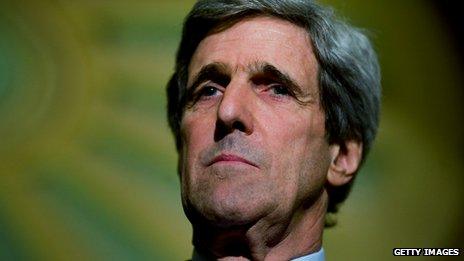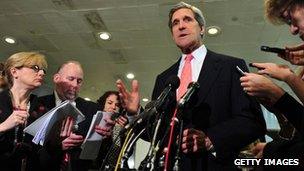John Kerry: From good soldier to secretary of state
- Published

John Kerry had been auditioning for the job of secretary of state for years before he was nominated by President Barack Obama ahead of his second term in the White House.
He had hoped to be appointed to the job in 2009. But Mr Obama picked Hillary Clinton and Mr Kerry became the president's good soldier in the Senate, pushing the administration's agenda as best he could, with varying degrees of success.
The Massachusetts senator has been chairing the Senate Foreign Affairs Committee since 2009 and is well-steeped in the details of world affairs and diplomacy from years of committee hearings but also hands-on experience.
Mr Kerry brings with him to the job valuable personal relationships with world leaders, from Afghanistan's President Hamid Karzai to Israel's Prime Minister Benjamin Netanyahu.
He will in many ways be able to hit the ground running, once he is confirmed in the new year. The confirmation process is expected to be speedy.
Intractable problems
Over the last four years, Mr Kerry has also been the administration's unofficial envoy to various hotspots.
US President Barack Obama says John Kerry is the "perfect choice"
In 2009, he travelled to Kabul to convince Mr Karzai to agree to a run-off in the presidential election. He travelled to Pakistan several times, including last year after the Osama Bin Laden raid, to help defuse anger over the unilateral action.
Deliberate and strategic, Mr Kerry is also very secretive, which could work well for a secretary of state who may want to try his hand at Middle East peace-making.
It's still unclear how much President Obama will want to delve in the intractable conflict after his failed attempts during his first term. But Mr Kerry will see this as one of the key areas where he can make his mark in history.
Although Mrs Clinton was involved in efforts to get peace talks off the ground, she chose not to be too closely associated with an issue that has left many presidents and secretaries of state frustrated.
Syria's ongoing conflict and Iran's nuclear programme will be two pressing issues in Mr Kerry's inbox.
The senator tried engagement with Syria, testing the waters for the administration starting in 2009. He spoke often of the close relationship he had built with president Bashar al-Assad.
But he was criticised for being naive about Syria when he continued to speak in positive terms about President Assad for several weeks after the Syrian revolution had started and insisted that President Assad would be able to reform. Mr Kerry has now said that US inaction on Syria was too costly.
Positive reactions
Mr Kerry's wasn't the president's first choice the job this time around, either.
The front-runner was Susan Rice, the UN ambassador and close ally of President Obama.
Damaged by the fallout of the Benghazi attacks which killed Ambassador Chris Stevens and three other Americans, Mrs Rice bowed out last week, saying the political attacks against her were a costly distraction from the job at hand.
Positive reactions have poured in for Mr Kerry's nomination, including from Republicans in Congress who had seized on Mrs Rice.
David Aaron Miller, a former state department official and Middle East peace negotiator, said Mrs Rice would have been a better choice if President Obama wanted to get things done. But he added that Mr Kerry was a perfectly "fine" and "safe" choice.
Mr Kerry is expected to be a good soldier within the administration as well.
He will diligently implement the president's foreign policy agenda but will not fear to speak his mind, according to people who have worked with him.
Mr Obama and Mr Kerry first met in the spring of 2004. Then a presidential candidate, Mr Kerry brought Mr Obama to national attention when he picked the little-known Illinois senator to deliver the key note address at the Democratic convention.
This year, Mr Kerry pitched in to get the president re-elected, prepping Mr Obama for the presidential debates as a Mitt Romney's stand in during preparations and delivering a speech at the Democratic convention.
"Ask Osama bin Laden if he's better off now than he was four years ago," said a feisty Mr Kerry during his convention speech.
Mr Kerry's address also reflected the world view he shares with President Obama and the outgoing Secretary of State. Mr Kerry praised the president's work to restore America's moral authority.
In many ways, Mr Kerry is the quintessential American diplomat.

Kerry commanded attention as chair of the senate foreign affairs committee
His father was in the Foreign Service. Mr Kerry has lived abroad and speaks French. He can sit for hours sipping tea with world leaders. But it's often hard to tell where he stands on the issues.
Mr Kerry will have big shoes to fill. Mrs Clinton's tireless public diplomacy has helped repair the damage to America's standing on the global stage and world leaders have been begging her to stay in the job.
President Obama, too, asked her to keep serving. At the state department, Clinton laid the foundations for a "smart power" approach to the exercise of American leadership.
Although Mr Kerry's view of American power is similar, his style will be very different.
It's unclear whether he will be keen on public diplomacy.
Mr Kerry's also not known to be a good team manager, which was apparent during his presidential campaign and one of his key challenges may be managing the cast of thousands who will now be working for him.
- Published21 December 2012
- Published20 December 2012
- Published16 November 2012